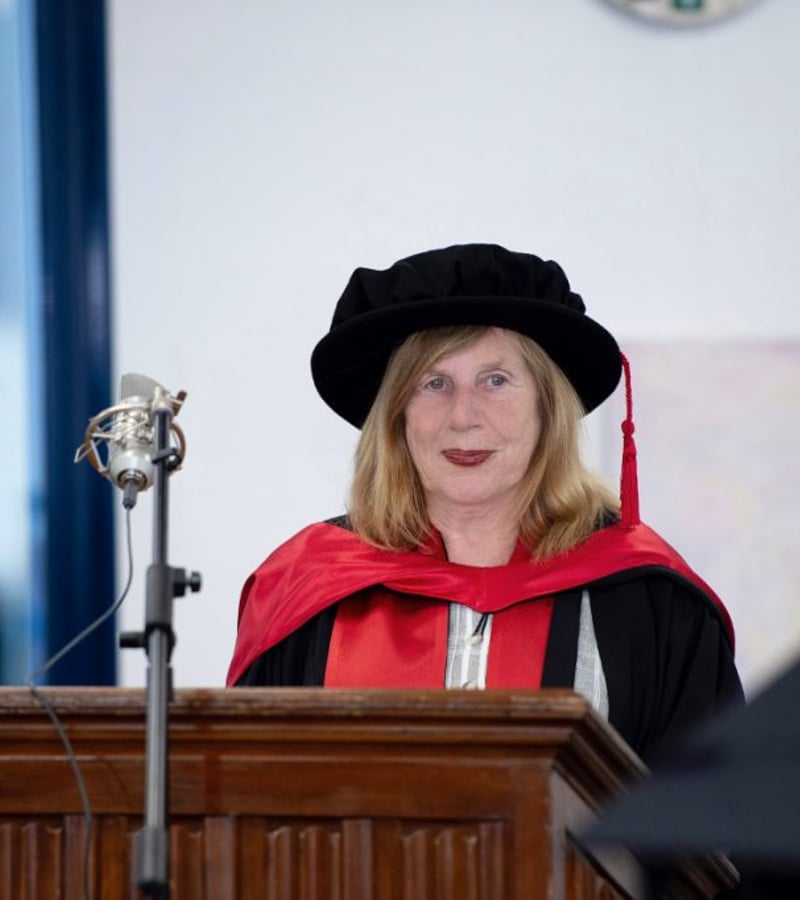
The recent appointment of Susan Long to the rank of Professor at NIODA follows her more than 50 years of rigorous scholarship as she has grown her own distinctive practice as a thinker, author, teacher and action researcher.
The authority to profess Susan Long
The shorter Oxford dictionary defines a Professor as a public teacher of the highest rank in a specific faculty or branch of learning. The title designates one who is accorded the authority to profess their thoughts, understanding and sentiments to a public that should be willing to listen and be influenced by the Professor’s erudition.
The recent appointment of Susan Long to the rank of Professor at NIODA surely accords with this definition following as it does her more than 50 years of rigorous scholarship in the fields of psychology, psychoanalytic psychotherapy, clinical practice, group relations, social dreaming and education, each discipline informing the other, as she has grown her own distinctive practice as a thinker, author, teacher and action researcher. Her curiosity about, and respect for, the ‘unconscious’ has led her to explore it from many angles including the historical, the here and now, and the prospective. Her recently conceptualised differentiation of the ‘associative unconscious’ from Freud’s notion of the repressed unconscious is breathing new possibilities into our understanding of creativity as social process. She is a restless inquirer.
Students of Organisation Dynamics learn that the concept of ‘authority’, whilst essential to the process of reliable organising, regulating and acting, has many vicissitudes.
In society today there is much concern about whether our authorities can be trusted. And as long ago as the 17th century the philosopher John Locke so wisely warned that every error known to mankind has had its professor. In this case, we can rely on the fact that Susan Long has previously held professorial appointments at two universities, Swinburne and RMIT, has many peer-reviewed publications and research grants, and has been elected, by her peers, as President of both local and international professional associations. Her ‘top-down’ authority is assured. But what about her ‘bottom-up’ authorisation? Are students and clients still willing to listen? Well, her supervision to completion of 22 PhD students, so far, helps answer that question. As does the number of requests for her service as an examiner and consultant, along with the ‘sold out’ status of her writing workshops, the repeated invitations she receives to work on the staff of group relations conferences in Australia and overseas, and the applause from many current and past students at the news of her NIODA appointment. The key to this respect, I think, is Susan’s profound understanding that authority which cannot be questioned is just power. She always invites others, students, colleagues and clients alike, to question their experience, including their experience of her, in order to think together about how emotional currents are shaping their views of reality, the possibility of collaborating, and the ethics that will guide their behaviour.
NIODA is honoured and enriched by Susan’s appointment and her continuance in the role of Director, Research and Scholarship. Long may she continue to profess and to guide NIODA’s students in the making of good authority for an uncertain world.

Prof John Newton
Chair Academic Board of Governance, NIODA
1 May 2020
The Authority to Profess – Susan Long
ps Are you a leader or manager and would like to learn more about making good authority? Have a look at the NIODA Master of Leadership and Management (Organisation Dynamics) course.
The Authority to Profess by Prof John Newton
Related insights

Leading from the Middle: Power, Reality, and the Courage to Work Together
What if the real power in your organisation sits in the middle — but goes unused? Mark Carney's recent Davos speech on middle powers sparked a reflection on something we see repeatedly: middle leaders orient up and down the hierarchy, but rarely sideways. Yet the middle holds unique potential to integrate, coordinate, and strengthen the whole system.

Reflections on completing a Masters

Revelation, Not Salvation
Salvation is about being rescued from difficulty. It’s the quick fix, the ready-made model, the externally imposed solution. Revelation, on the other hand, is about discovery.
